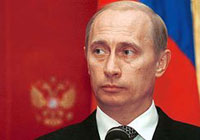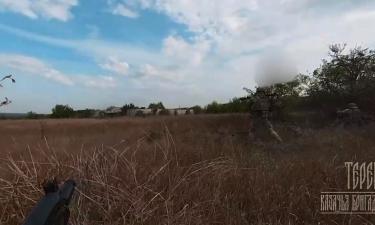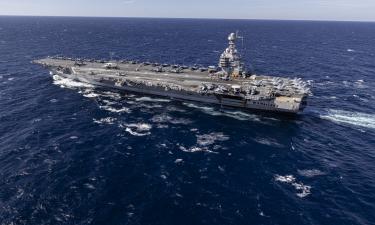Russia has no plans to join EU
Last weekend President Putin extended his congratulations to German Chancellor Angela Merkel on the occasion of the 50th anniversary the Treaty of Rome, which laid foundations of the European Union. Germany currently holds presidency of the EU. A number of European newspapers published Putin’s article entitled “50 Years of European Integration and Russia” on Sunday. Below are the excerpts from the article.

On Russia’s integration into the EU
“Developing multifarious relations with the EU is Russia’s own choice solidly based on principles. It’s true that we have neither the intention of joining the EU nor of establishing any common institutions in the foreseeable future, for obvious reasons. Looking realistically at the way things stand, Russia intends to build its relations with the EU on the basis of contractual obligations and principles of strategic partnership. I’d like to stress the point that we are ready to go as far as possible in this partnership provided our partners meet us halfway. An agreement on relaxation of visa requirements will come into effect soon. We see the agreement as an important step for signing an agreement on visa-free travel.”
On bloc-oriented approaches to European politics
“I hope that we will opt to join forces for the purpose of building our common future. We should not allow bloc-oriented approaches to prevail in European politics; we should not allow either new dividing lines in the continent or unilateral projects to be implemented to the detriment of the interests and security of our neighbors.”
On differences between Russia and the EU
“The interests of Russia and the European Union cannot, without doubt, be in complete agreement at all times. Competition is the other side of cooperation and an unalienable part of the globalization process. In the meantime, the EU nations should not politicize their economic ties with Russia and superimpose the Cold War-era ideological labels on Russia’s actions aimed at defending national interests. Russia is ready to resolve potential differences through an open dialogue and compromise based on a set of rules agreed upon by both sides.
On a multi-polar world order
As we build an independent and democratic state these days, we fully share the basic values and principles which make up the views of the majority of Europeans. We share respect for the international law. Not unlike the EU, we reject the use of force in the settlement of international problems, and we also support the strengthening of a collective basis in European and global politics. We view the European integration as an objective process that represents an integral part of the emerging multi-polar world order. Therefore, it is important for us to witness the EU become an increasingly authoritative and influential center of the world politics; the organization which makes a substantial contribution to solving issues related to regional and global security.”
Komsomolskaya Pravda: There is an intriguewaiting in the wings to impact the triangle comprising Russia, the U.S., and the EU
The foundations of the European Union were laid by leaders of France, West Germany, Belgium, the Netherlands, Luxembourg, and Italy in Rome on March 25, 1957.
The above nations signed the Treaty of Rome to establish the European Economic Community, a prototype of the EU. Just a handful of Europeans believed at the time that the EEC otherwise known as the Common Market would get off the ground and evolve into a sustainable organization.
The EU has become a powerful geopolitical bloc in the last fifty years. The 27-member European Union today has a total population of 493 million people. With a common trade and labor market, it is the world’s largest economic entity. The euro, the EU’s single currency, pushed the dollar somewhat aside. Many Eastern European states of the former Soviet bloc already joined the EU along with a number of the former Soviet republics. However, the EU has yet to address a lot of issues, the EU constitution being one of them.
The strategic partnership between Russia and the EU is more dependent on geographical factors than on politics. The historical and economic ties between Russia and European states have existed for ages. Lately Russia has become the EU’s main energy supplier. The disruption of the bilateral ties is likely to result in most dire consequences for either side. In view of the above, both Russia and the EU should step up efforts to ensure a higher level of economic integration and interaction.
Another aspect of the problem is worth mentioning. It is an open secret that the U.S. is rather unhappy about Russian-EU cooperation in terms of economic relations and politics alike (for instance, both Russia and the EU condemned the U.S.-led invasion of Iraq). The U.S. makes use of the newly integrated EU member states, which greatly depend on US support and funding, for driving a wedge between the EU and Russia. America is planning to deploy elements of its missile defense system in Poland and Czech Republic; it also gets Poland, which all of a sudden became preoccupied with the ban imposed by Russia on imports of Polish meat, to block attempts aimed at striking a new partnership and cooperation agreement between the EU and Russia. Besides, there is a continued flow of rhetoric spilling across the Atlantic to accuse Moscow of “using its energy supplies as a tool for pursuing expansionist policy in the West.”
No wonder the U.S. looks increasingly concerned about the future of Russian-EU relations. European countries are likely to have second thoughts about America’s “military protection” for the continent should the EU and Russia work out a course of action to ensure a much closer cooperation. It seems that a geopolitical intrigue arising from the relations between Russia, the U.S., and the EU will become one of the most sensitive issues within the next ten years.
Komsomolskaya Pravda
Translated by Guerman Grachev
Subscribe to Pravda.Ru Telegram channel, Facebook, RSS!





